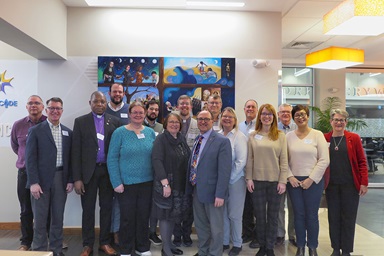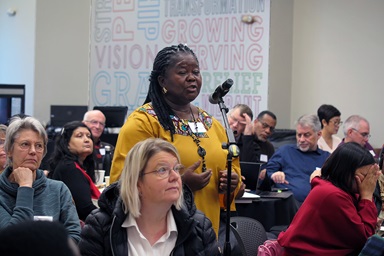We are at the mid-point of the 2012 General Conference. The legislative committees have completed their work, and majority and minority reports will come to the plenary. We have worshipped together, and begun a journey of repentance in our relationships with indigeneous peoples. We have acknowledged the steep decline of vitality in the U.S. church, and witnessed the growth of the Methodist movement in the Central Conferences. The General Conference is truly a global gathering, and the composition of the body is indicative of this reality.
At we enter into the second week of conferencing, three words have emerged for me:
Process. A great deal of time, energy and debate is devoted to questions around process: rules, committee and subcommittee leadership, and allocation of time. Why? Most of us know that the rules have a way of shaping the outcomes, and most of us are leaders who are accustomed to weighing in on matters of process. And so significant time is spent debating the rules of the body and voting on leadership (many of the votes on chairpersons were extremely close). The decisive vote to end debate on legislation by Saturday evening of the first week was a clue that the body would allow a degree of questioning and process, but in the end closure would be self-imposed.
Protest. The General Conference is about internal issues but also how we engage with the larger world. While our primary agendas are not related to human sexuality or political activism, persons with passions in those areas (within and outside the UMC) view our gathering through those prisms. And so a growing number of persons greet delegates each day with materials related to gays and lesbians, abortion, the Israeli-Palestinian question (the engagement has been particularly intense thus far), human trafficking and immigration. The appropriateness or legality of protesting within the bar of the conference has already been questioned, and if the past is any indication, there are multiple plans in place for protests in the second week.
Power. Underneath the Call to Action, Plan B and the MFSA response lies the issue of power. How will power be distributed across the Council of Bishops and General Boards and Agencies, the clergy and the laity, the churches of the U.S. and those in the Central Conferences? While the renewal of the church is the presenting issue, what we are struggling with is who will be empowered to lead us through change. Power is also a current within legislation related to ordained ministry and episcopacy. If the continued appointment of elders is modified or eliminated, it is also likely that the question of term episcopacy in the U.S. will be linked to it: if power is taken from one group, that constituency will seek to achieve a kind of balance. Power is quantified in the final decisions about representation–who will serve on boards and how will they be placed there—and money—how will resources be allocated.
The realities of process, protest and power are significant in a democratic process where very strong, gifted and passionate leaders must watch as their hopes and dreams are delayed, resisted or modified into a form that is sometimes unrecognizable. Alongside all of this, of course, is the sense that this is or might be holy conferencing. Framing each day with morning prayer and evening worship lifts our eyes to the God whose work we gather to do and whose mission we have inherited and seek to pass along to the next generation. More than any general conference in my experience, the decisions over the next days will very likely have a dramatic effect on who we are and will be as United Methodists.
Like what you're reading? Support the ministry of UM News! Your support ensures the latest denominational news, dynamic stories and informative articles will continue to connect our global community. Make a tax-deductible donation at ResourceUMC.org/GiveUMCom.



